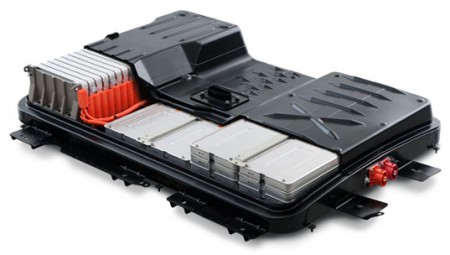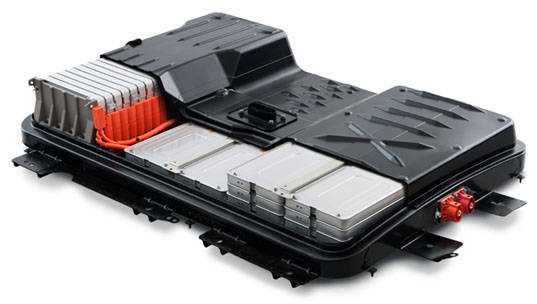April 3, 2015 – A new study by the Stockholm Environment Institute appearing in the journal Nature Climate Change traces the cost of lithium-ion battery packs for electric vehicles (EVs) showing an average decline of 14% annually between 2007 and 2014. The net reduction in terms of energy produced is equivalent to a drop from $1,000 U.S. per kilowatt-hour to $410. Industry leading EV manufacturers are besting that $410 average hitting a cost of $300.
As these costs per unit of energy produced decline it is clear that EVs are about to cross a threshold making them more attractive to mainstream purchasers. That threshold the industry has commonly agreed on is below the $300 per kilowatt-hour energy mark. Current lithium-ion battery pack costs are declining at a rate of 8% per year. Researchers predict lithium-ion batteries are on track to reach $230 per kilowatt-hour by 2018, and $167 by 2025. With Tesla building a new gigafactory and Nissan ramping its own large-scale battery production (the image below is of the battery pack in the Nissan Leaf) the 8% rate of price decline versus performance may further accelerate.
EV batteries today can be half the cost of the car. But as the batteries get more powerful two outcomes are foreseen. The first is EVs with current mileage ranges will get far cheaper and become an attractive option for urban drivers. The second is manufacturers will be able to pack more power into EVs to extend their range creating a premium product for both city and extended highway driving. For these premium extended range EVs, capable of achieving up to 480 kilometers (300 miles) in a single drive, the cost of a full charge based on current electricity costs would be less than $10 U.S. That’s far less than a tank of gasoline or diesel even in these oil-price depressed times.













The implications to atmospheric carbon load of $167 KWh Li batteries are deep and complex. The figures I will use in the following assessment are only imprecise approximations.
First, one should consider that the lifespan of Li-Ion batteries depends heavily on exactly how they are charged and discharged. For example, GM guarantees the Chevy Volt extended range hybrid-drive-train 18 KWh battery pack for 10-years or 150,000 miles (In some states only 8-years or 100,000 miles. The smart Volt buyer should probably pick a state with the longer guarantee. So far, however, very few Volt batteries have failed, and GM doesn’t prorate battery replacement.) To insure the Volt battery will last throughout the guarantee period, the Volt battery-control-computer conservatively limits charging to only 80% of full capacity and discharge to no more than 30%.So for all practical propulsion purposes the 2015 Volt battery can store and discharge only 9 KWh per cycle. By that standard, a durable $167 KWh Li battery would actually cost $334 per usable KWh.
But suppose the 50% of total capacity rule allows 2,000 charge/discharge cycles. Then battery depreciation costs alone for 18,000 KWh of useful energy would be about $0.17/KWh. So if grid electricity costs the Volt-owner $0.14 KWh, a Volt with $167 KWh batteries would cost over $2.80 to drive 30-miles on full electric. Since most grid energy comes from burning carbon based fuels, it’s hard to see how even $167 KWh Li batteries in
electric cars could have much positive impact on atmospheric carbon.
But cheap Li batteries in stationary applications might make a major positive impact on grid emissions, because wind and solar energy could be cheaply and reliably stored. Many families would install solar panels on their roofs and cheap lithium batteries in their garages or basements. The battery depreciation costs would still be $0.17 KWh, but that would only apply to energy cycled through the battery pack. So if the grid buys most of the sunshine hours energy, the homeowner might wind up paying only $0.04 per KWh he actually uses, and during daylight hours grid emissions would fall hugely. Present practice is to use the immediate consumption power grid itself as the “storage battery.” But that is a limited-scale parasitic condition that can probably never become mainstream. The cheap storage battery
could eliminate the parasitic component.
Li batteries at $167 KWh makes remote off-grid wind/solar energy economically attractive and practical.
As an interesting aside, used Volts are plentifully available in the Houston region for as little as $12,000. See the Houston Craigslist. This summer, I’m going to replace my old Grand Marquis with a later model used car. I’m torn between a super-plush 2006-8 Lincoln Towncar and a 2012-13 Volt. The staid and comfortable Town Car would be about half-price of the Volt, and I expect several more years of cheap gas prices, but the Volt would be loads more fun. The Volt is still sufficiently rare that thoughtful people stop owners and ask about it.
As always, insightful comments with well-reasoned arguments. I have seen two Volts in my neighbourhood here in Toronto in the last year. The Nissan Leaf and a Smart electric seem to be more common. But they remain early adopter technology at the moment. Range anxiety and lack of charging infrastructure make the technology less attractive, let alone sticker price and the current price of gasoline even up here in Canada.